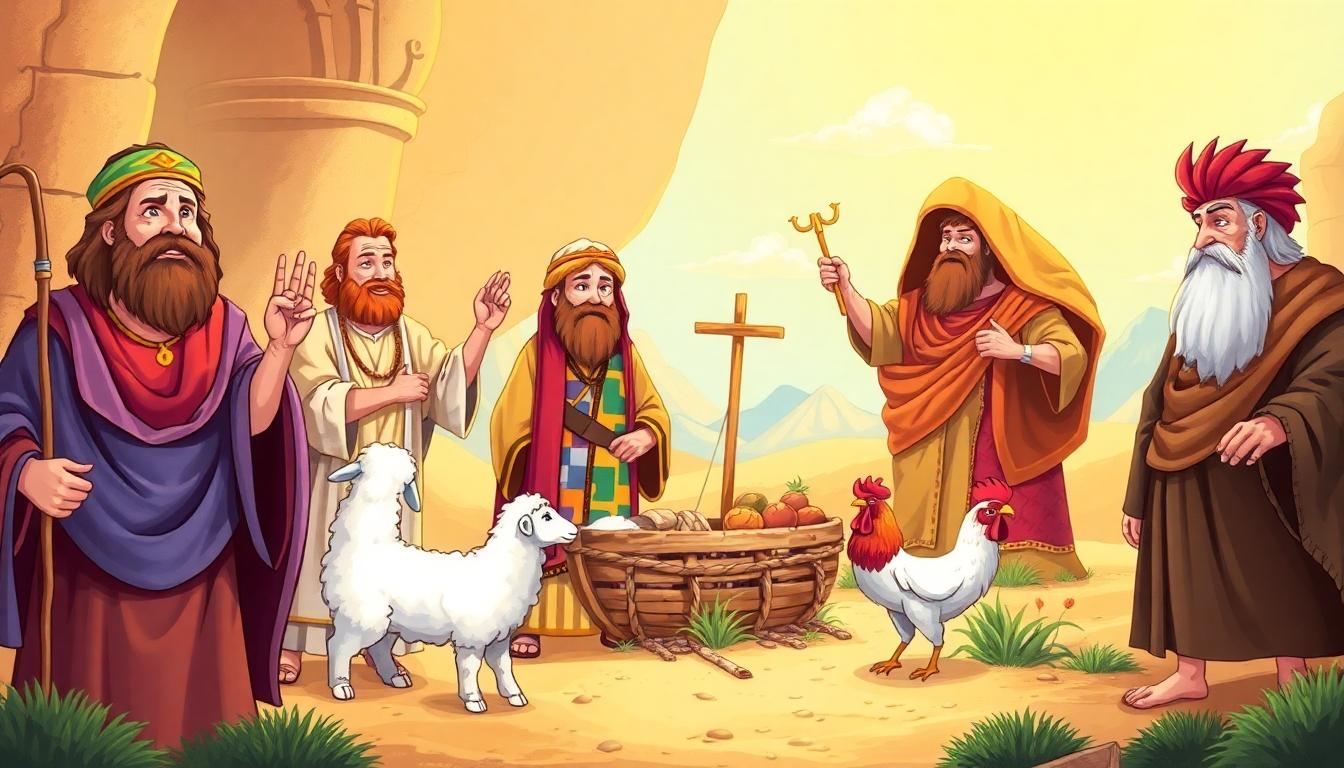Christian riddles offer a unique way to explore biblical teachings while having fun. We’ve gathered some of the most thought-provoking faith-based brain teasers that will challenge your spiritual knowledge and entertain believers of all ages. These riddles aren’t just entertaining—they’re also wonderful tools for Sunday school classes, youth groups, or family devotion time.
Looking for ways to make learning about Christianity more captivating? You’ll love our collection of Christian riddles that blend humor with biblical wisdom. Whether you’re searching for ice-breakers for church gatherings or wanting to test your own Bible knowledge, these riddles provide the perfect combination of entertainment and spiritual growth. Join us as we jump into these clever questions that will have everyone thinking deeply about their faith.
10 Thought-Provoking Christian Riddles to Test Your Biblical Knowledge
- I’m the longest day in the Bible, when the sun stood still. What day am I?
We find this remarkable event in the Book of Joshua when God made the sun stand still so Joshua could defeat his enemies. The answer is the day of Joshua’s battle against the Amorites (Joshua 10:12-14), often considered the longest day in biblical history.
- I was thrown into a den of lions but remained unharmed. Who am I?
This famous biblical figure served in the court of King Darius and was targeted by jealous officials. Daniel remained faithful to God even though the threat of death, and God shut the lions’ mouths to protect him (Daniel 6:16-23).
- I’m created in the morning, fly at noon, and die at night. What am I?
The answer points to our human condition as described in Psalm 90:6. We’re like grass that springs up fresh in the morning, flourishes briefly, and by evening withers away – a reminder of our fleeting existence compared to God’s eternal nature.
- I was the first to see Jesus after His resurrection. Who am I?
According to the Gospel accounts, Mary Magdalene was the first person to witness the risen Christ. Jesus appeared to her outside the empty tomb when she was weeping (John 20:11-18).
- I’m mentioned in the Bible 365 times. What am I?
“Fear not” or “do not be afraid” appears approximately 365 times throughout Scripture – one for each day of the year. God consistently reminds His people not to fear because He is with them.
- I built an ark but wasn’t Noah. Who am I?
This riddle refers to Moses’ mother, Jochebed, who built a small ark of bulrushes to save her son from Pharaoh’s decree. She placed baby Moses in this waterproof basket on the Nile River (Exodus 2:3).
- I’m the strongest man in the Bible whose strength came from my hair. Who am I?
Samson possessed supernatural strength as long as he kept his Nazirite vow not to cut his hair. His strength enabled him to perform incredible feats, including killing a lion and defeating armies (Judges 13-16).
- I walked on water but began to sink when I took my eyes off Jesus. Who am I?
Peter briefly walked on water toward Jesus during a storm on the Sea of Galilee. When he became frightened by the winds and waves, he began to sink until Jesus reached out and saved him (Matthew 14:28-31).
- I was swallowed by a great fish and lived to tell about it. Who am I?
Jonah tried to flee from God’s command to preach to Nineveh. During his escape by sea, a violent storm arose, and Jonah was thrown overboard, then swallowed by a great fish where he remained for three days before being vomited onto dry land (Jonah 1-2).
- I’m the longest book in the New Testament. What am I?
The Gospel of Luke contains 24 chapters and 1,151 verses, making it the longest book in the New Testament. Luke meticulously documented the life and teachings of Jesus Christ, addressing his account to Theophilus and focusing on Jesus’ compassion for the marginalized.
The Mystery of Creation: Christian Riddles About Genesis

Genesis provides fertile ground for Christian riddles that challenge our understanding while strengthening our faith knowledge. The biblical account of creation contains many elements that make for captivating and thought-provoking brain teasers.
The Garden’s Puzzle
The Garden of Eden offers many fascinating elements that transform into challenging riddles. Biblical scholars often create puzzles around the four rivers mentioned in Genesis—particularly the Tigris and Euphrates—that flowed through this paradise. Questions like “I flow through Eden and still exist today; what river am I?” test knowledge of biblical geography. The special conditions God established for Adam before Eve’s creation make excellent riddle material, such as “What job did the first man have before meeting his wife?” (Answer: Naming the animals). Tree of knowledge riddles explore the boundaries God set, asking believers to ponder questions like “What fruit is never named but changed human history forever?”
Adam and Eve Enigmas
Adam and Eve’s story contains many fascinating details that form the basis for clever biblical riddles. Questions about Adam’s rib often appear in Christian puzzles, challenging people to recall how God created the first woman. Riddles might ask “What was the first surgical procedure in history?” or “What body part became someone else?” referring to Eve’s creation from Adam’s rib. Their fateful decision to eat the forbidden fruit inspires riddles like “What meal cost humanity paradise?” or “Who was history’s first food critic?” Fun brainteasers about Adam’s job naming the animals include questions such as “Who created the first dictionary?” These enigmas encourage deeper engagement with scripture while making biblical learning enjoyable for Sunday school classes, youth groups, and family devotion times.
Biblical Figures in Clever Christian Riddles

Biblical figures offer rich material for captivating Christian riddles that test knowledge while bringing scripture to life. These brain teasers challenge believers to recall important characters from both Old and New Testaments in clever ways.
Prophets and Patriarchs
Old Testament figures feature prominently in these thought-provoking riddles that connect us to ancient biblical history:
- Samuel’s Identity: “And Samuel asked him, Are these all the sons you have? Jesse replied there was still the youngest, but he was tending the sheep. Who am I?” The answer is Samuel, the prophet who anointed David as king.
- Joseph’s Colorful Story: “Betrayed for silver into Egypt, I fled, my technicolour Dreamcoat, leaving brothers in dread. Who am I?” This riddle references Joseph, whose jealous brothers sold him into slavery.
- Noah’s Vessel: “What was the name of the ship that saved the animals from the flood?” The straightforward answer is Noah’s Ark, recalling the famous biblical account of worldwide deluge and salvation.
- Samson’s Challenge: One of the most famous biblical riddles comes from Judges 14:12-14, where Samson posed: “Out of the eater, something to eat; out of the strong, something sweet.” This clever riddle referred to honey Samson found in a dead lion’s carcass.
New Testament Characters
These riddles focus on figures who walked with Jesus or played important roles in the Gospels:
- Judas Iscariot’s Betrayal: “Thrice, the rooster, crowed after I silvered my wage, a betrayal not shy. Who am I?” This riddle points to Judas Iscariot, who betrayed Jesus for thirty pieces of silver.
- Peter’s Vision: “I watched something like a sheet filled with animals coming from heaven. Who am I?” The answer is Peter, referencing his famous vision in Acts 10 that convinced him to preach to Gentiles.
- Simon of Cyrene’s Burden: “I carried Jesus’ cross when he could no longer bear it. Who am I?” This riddle highlights Simon of Cyrene, who was compelled to help Jesus on the way to His crucifixion.
These biblical figure riddles serve as excellent tools for Sunday school activities, youth group meetings, or family Bible study sessions. They encourage deeper engagement with scripture while making the learning process enjoyable and memorable for Christians of all ages.
Christian Riddles Based on Jesus’s Parables

Jesus masterfully used parables as teaching tools, and these stories provide perfect material for thought-provoking Christian riddles that challenge and inspire.
Kingdom of Heaven Mysteries
The Kingdom of Heaven featured prominently in Jesus’s teachings, often presented through riddle-like parables that required spiritual discernment to understand. Try these Kingdom-themed riddles based on Jesus’s teachings:
- Hidden Treasure Riddle: What is worth selling everything you own just to possess it? Answer: The Kingdom of Heaven (Matthew 13:44).
- Mustard Seed Mystery: How can the smallest seed grow into the largest garden plant? Answer: God’s Kingdom starts humbly but flourishes beyond expectation.
- First and Last Paradox: In what kingdom do the first become last and the last become first? Answer: The Kingdom of Heaven (Matthew 20:16).
- Leaven Logic: What transforms slowly from within, like yeast spreads through dough? Answer: The Kingdom of Heaven (Matthew 13:33).
- Sign of Jonah: What messianic sign did Jesus give that paralleled a prophet’s three days in a fish? Answer: His resurrection after three days in the tomb (Matthew 12:39-40).
Moral Lessons in Riddle Form
Jesus frequently encoded ethical teachings in his parables, which we can transform into captivating riddles that challenge both biblical knowledge and moral understanding:
- Tree Climber’s Transformation: Who climbed a sycamore tree to see Jesus and afterward pledged four-fold restitution? Answer: Zacchaeus (Luke 19:1-10).
- Silver Betrayal: What man, after betraying Jesus for thirty pieces of silver, met his end by hanging himself? Answer: Judas Iscariot.
- Four-Day Wonder: What dead man walked out of his tomb after four days when Jesus called his name? Answer: Lazarus (John 11:1-44).
- Prodigal’s Return: Which son was lost but found, dead but alive again? Answer: The Prodigal Son (Luke 15:11-32).
- Good Neighbor: Who acted as a true neighbor to the man beaten by robbers on the road to Jericho? Answer: The Good Samaritan (Luke 10:25-37).
- Pearl Seeker: What businessman sold all he had when he found one perfect specimen? Answer: The merchant seeking fine pearls (Matthew 13:45-46).
These riddles distill complex spiritual lessons into memorable, interactive formats, making them ideal for Sunday school classes, youth group activities, or family devotional time. They encourage deeper engagement with scripture while making biblical learning enjoyable and thought-provoking for Christians of all ages.
Scripture-Based Christian Riddles for Family Fun

Easy Riddles for Young Believers
Young children can begin their biblical journey with simple riddles that reinforce foundational stories from Scripture. These age-appropriate brain teasers help little ones connect with key biblical figures while having fun. “I was made in God’s image but disobeyed His command. Who am I?” introduces children to Adam and the creation story. Another captivating example asks, “A big ship saved me from a flood. Who am I?” pointing young believers toward Noah and his ark. We’ve found that these simpler riddles work wonderfully during Sunday school lessons or family devotion time. Children particularly enjoy the riddle “I was laid on a stone as a test of faith, but a ram took my place,” which teaches them about Abraham’s faith and God’s provision for Isaac.
Challenging Puzzles for Bible Study Groups
Bible study groups thrive on riddles that require deeper scriptural knowledge and analytical thinking. “I wrestled with God and earned a new name. Who am I?” challenges participants to recall Jacob’s groundbreaking encounter at Peniel. Groups can also ponder, “I toppled walls by marching and trumpet blasts. What am I?” to discuss the Battle of Jericho and the power of faith-based obedience. One historically important riddle comes directly from Scripture itself: “Out of the eater, something to eat; out of the strong, something sweet.” This famous puzzle from Judges 14:12-14 references Samson’s discovery of honey in a lion’s carcass. These more complex riddles encourage group members to dig deeper into biblical texts, fostering meaningful discussions about lesser-known details and their spiritual applications. The collaborative solving process strengthens both biblical literacy and community bonds among believers.
Christian Riddles with Historical Context

Christian riddles have deep roots in biblical narratives and teachings, serving as powerful tools for conveying spiritual wisdom throughout history. These enigmatic expressions challenge believers to seek deeper understanding while making spiritual truths memorable.
Ancient Church Wisdom
Biblical texts frequently employ riddles as teaching devices, particularly in books like Proverbs where they’re used to impart wisdom and expose moral shortcomings. These sacred riddles require spiritual discernment to fully comprehend, symbolizing God’s hidden wisdom that’s revealed to faithful seekers. The complexity of these puzzles reflects the biblical principle that certain truths require both intellectual effort and spiritual receptivity.
Jesus himself was a master riddler, with his parables functioning as spiritual enigmas that revealed profound truths to receptive hearts while remaining obscure to those unwilling to listen. Many of his teachings used everyday scenarios to convey challenging spiritual concepts, creating a natural filter—those truly seeking understanding would grapple with the deeper meaning while casual listeners might miss the point entirely. The parabolic method ensured that spiritual truths were accessible yet required genuine engagement.
Faith Traditions in Riddle Form
Samson’s famous wedding riddle in the Book of Judges demonstrates how riddles were integrated into important social occasions in ancient times. His challenging puzzle—”Out of the eater came something to eat, out of the strong came something sweet”—reveals how riddles served both entertainment and cultural purposes in biblical society. This practice of posing intellectual challenges at gatherings helped create community bonds while testing wisdom.
Prophetic books use symbolic riddles to convey complex political messages, as seen in Ezekiel’s eagle allegory representing King Nebuchadnezzar. These symbolic puzzles allowed prophets to deliver sensitive political commentary in a form that required interpretation, protecting both the messenger and audience while ensuring the message reached those with ears to hear. Such coded communications proved especially valuable during times of oppression or exile.
The Book of Revelation contains perhaps the most famous mathematical riddle in scripture with the enigmatic “number of the beast” (666), which has puzzled interpreters for centuries. This numerical mystery exemplifies how ancient Christian riddles incorporated mathematics and gematria (number-letter associations) to convey spiritual meanings. The persistent fascination with this particular riddle demonstrates how effectively these ancient puzzles maintain engagement with biblical texts across millennia.
The Symbolism Behind Christian Riddles

Christian riddles serve as powerful vehicles for conveying deeper spiritual truths, often hiding wisdom from casual observers while revealing profound insights to those who seek with sincere hearts. These symbolic puzzles have been woven throughout scripture to test spiritual understanding and encourage deeper reflection on biblical teachings.
Numbers and Their Biblical Significance
Numbers in Christian riddles carry profound symbolic weight that extends beyond their mathematical value. Perhaps the most famous numerical riddle in scripture appears in Revelation 13:18, where the mysterious “number of the beast” (666) challenges readers to decipher its spiritual significance. Throughout Christian history, this number has sparked countless interpretations and discussions, demonstrating how numerical riddles can preserve deep theological concepts across generations. Biblical numbers often function as coded messages, inviting believers to look beyond surface meanings to discover hidden spiritual truths.
Animals and Objects in Scripture
Animals and everyday objects frequently appear in biblical riddles, serving as powerful symbols that communicate complex spiritual messages. Samson’s famous riddle in Judges 14:14 exemplifies this tradition perfectly: “Out of the eater came something to eat, and out of the strong came something sweet.” This cryptic statement referenced his personal experience of finding honey in a lion’s carcass, transforming a violent encounter into a source of sustenance and sweetness. The symbolism creates multiple layers of meaning that reward thoughtful contemplation.
Prophetic literature also employs animal symbolism in riddle form, as seen in Ezekiel 17:1-10, where an eagle represents King Nebuchadnezzar of Babylon. This symbolic approach allows the biblical author to address themes of power, dominance, and divine judgment in a memorable format that captures the imagination while conveying critical spiritual warnings. These animal-based riddles demonstrate how ordinary creatures can become extraordinary vehicles for divine revelation when interpreted through the lens of faith.
Christian Riddles for Teaching Key Doctrine

Christian riddles serve as powerful pedagogical tools that transform complex theological concepts into captivating word puzzles. These thought-provoking questions use paradox and wordplay to deepen understanding of fundamental Christian beliefs.
Salvation Themes
Salvation-themed riddles capture the beautiful paradoxes at the heart of Christian redemption. Consider this profound example: “I am free yet bought with a price; dead yet alive forever. What am I?” The answer is a saved believer, reflecting the biblical truths found in John 5:24 and 1 Corinthians 6:20. These riddles mirror Jesus’ own paradoxical teachings, such as “Whoever loses their life will preserve it” (Luke 17:33), emphasizing the sacrificial nature of redemption. We’ve found that such puzzles help believers internalize complex doctrines about grace, justification, and eternal life in memorable ways.
Holy Trinity Puzzles
The mystery of the Trinity provides fertile ground for Christian riddles that illuminate this central doctrine. A classic example asks: “Three in one, one in three; Creator, Savior, Guide are we. What are we?” The answer is the Trinity (Father, Son, and Holy Spirit). This puzzle draws directly from Jesus’ triadic formula in Matthew 28:19 and references the “Spirit, water, blood” testimony mentioned in 1 John 5:7-8. Trinity riddles help Christians visualize and comprehend the three-person nature of God while maintaining the essential truth of monotheism. They transform an abstract theological concept into a concrete mental picture that resonates with believers of all ages.
Didactic Function
Christian riddles serve exact teaching purposes that follow biblical precedents. Jesus himself used riddles to conceal truth from those with hardened hearts while revealing it to sincere seekers, as explained in Matthew 13:10-15. His paradoxical language, like “The first will be last” (Matthew 20:16) and “You must be born from above” (John 3:7), challenged listeners to reconsider their spiritual assumptions.
The tradition of educational riddles has deep roots in scripture. The Old Testament employs this technique in Proverbs 30:15-31, using riddles to impart wisdom. In the New Testament, Jesus asked “How can Satan cast out Satan?” (Mark 3:23) to expose logical fallacies in his opponents’ arguments. We continue to use these time-tested methods in modern catechism and apologetics to foster deeper engagement with doctrine and help believers internalize essential Christian truths.
Using Christian Riddles in Ministry and Outreach

Christian riddles serve as powerful tools for captivating audiences in both informal settings and structured outreach programs. They create opportunities for meaningful connections while teaching biblical principles in memorable ways.
Ice Breakers for Youth Groups
Christian riddles function as excellent ice breakers for youth groups, fostering camaraderie while encouraging discussions about biblical themes. Young people naturally enjoy solving puzzles, making riddles like “Who was the most successful doctor in the Bible?” (Answer: Job) an captivating way to start conversations about scripture. These fun brain teasers help break down social barriers between group members while simultaneously introducing important faith concepts. Youth ministers find that beginning sessions with riddles creates an atmosphere of active participation rather than passive listening, setting the stage for deeper spiritual discussions as the meeting progresses.
Evangelism Through Captivating Questions
Thoughtful riddles provide natural openings for faith conversations in evangelistic settings. Word of Life Evangelism Ministries uses riddles such as “The one who made it didn’t need it. The one who bought it didn’t use it. The one who used it didn’t know it” (Answer: coffin/casket) to initiate profound discussions about life, death, and redemption. These conversation starters help bridge the gap between everyday topics and spiritual truths, creating opportunities to share the Gospel in non-threatening ways. Churches incorporate riddle-based activities into community events, encouraging teamwork while exploring different ministries within their congregation. Activities centered around solving biblical puzzles help build relationships across generations while promoting creative thinking about spiritual matters. Many outreach programs find that interactive challenges based on scripture create memorable experiences that participants continue to reflect on long after the event concludes.
Brain-Teasing Christian Riddles About End Times

Revelation Puzzles and the Beast
The Book of Revelation offers some of the most intriguing material for Christian riddles about end times. Perhaps the most famous biblical riddle appears in Revelation 13:18, where readers are challenged to decipher “the number of the beast” – 666. This mathematical riddle has puzzled theologians and Bible scholars for centuries, with countless interpretations proposed throughout history. Many believe this number represents a exact person who will rise to power during the end times, while others interpret it as symbolic of human imperfection (falling short of God’s perfect number 7).
Decoding Daniel’s Prophecies
Daniel’s prophecies contain many symbolic riddles about future kingdoms and end-time events. His visions of beasts representing industry empires (Daniel 7) and the mysterious “seventy weeks” prophecy (Daniel 9:24-27) function as divine riddles that require careful interpretation. These prophetic passages use imagery that seems intentionally cryptic, challenging readers to look beyond the literal text to uncover deeper spiritual meanings. Biblical scholars often approach these passages as symbolic puzzles that provide clues about God’s timeline for human history and the eventual return of Christ.
Symbolic Language in Ezekiel
Ezekiel’s prophetic book contains several riddle-like passages that many Christians connect to end times theology. For example, Ezekiel 17:1-10 presents a symbolic riddle about two eagles and a vine that represented political events involving King Nebuchadnezzar in the prophet’s day. This pattern of using symbolic language to encode prophetic messages continues throughout Ezekiel’s writings. The detailed vision of the restored temple (Ezekiel 40-48) remains one of the Bible’s most complex prophetic riddles, with scholars debating whether it represents a literal future building or symbolic spiritual realities.
End Times Riddles for Reflection
Here are some thought-provoking Christian riddles that encourage reflection on end times themes:
- “I am mentioned in Revelation as something that will be no more. Kings and nations fear my arrival, yet without me, there would be no life. What am I?” (Answer: The sea – Revelation 21:1)
- “I appear seven times in Revelation, each time bringing judgment. My sound heralds dramatic events in the end times. What am I?” (Answer: A trumpet)
- “I represent both perfect completion and severe judgment in end times prophecy. Nations tremble when I am poured out. What am I?” (Answer: The seven bowls of God’s wrath)
- “Jesus said I will come like a thief, unexpected and without warning. Wise believers watch for my signs. What am I?” (Answer: The Day of the Lord)
Interpretation Challenges in Prophetic Riddles
Prophecies about the end times often employ symbolism that functions similarly to riddles, requiring spiritual discernment and careful study. The apocalyptic literature in both Daniel and Revelation uses numbers, animals, and cosmic events as symbols that convey deeper meanings. These prophetic passages intentionally obscure their messages in symbolic language, resembling riddles that protect their content from casual readers while revealing truth to those who diligently seek understanding. The symbolic nature of these texts has led to diverse interpretations throughout church history, with differences of opinion about whether certain passages should be understood literally or figuratively.
How Christian Riddles Strengthen Faith and Biblical Literacy
Christian riddles offer so much more than mere entertainment. They connect us to scripture in memorable ways while challenging our biblical knowledge and spiritual understanding. From creation accounts to end times prophecies these brain teasers make faith exploration captivating for believers of all ages.
We’ve seen how these riddles work wonderfully in Sunday school youth groups and family devotions bringing laughter and learning together. They transform ordinary Bible study into ever-changing interactive experiences that stick with us long after the answer is revealed.
By incorporating these riddles into your spiritual practices you’ll discover renewed excitement for scripture study. They’re powerful tools that simultaneously test knowledge strengthen faith and create meaningful connections within your Christian community. So go ahead share a riddle and watch as curiosity sparks deeper engagement with God’s word.
Frequently Asked Questions
What makes Christian riddles valuable for spiritual growth?
Christian riddles blend entertainment with biblical education, making scripture more engaging and memorable. They challenge spiritual knowledge while promoting deeper reflection on biblical teachings. These thought-provoking puzzles serve as excellent tools for Sunday school, youth groups, and family devotions, helping believers of all ages connect with their faith in a fun, interactive way while strengthening their understanding of key biblical concepts.
How can Christian riddles be used in church settings?
Christian riddles can enliven Sunday school lessons, youth group meetings, Bible studies, and church socials. They serve as excellent icebreakers, team-building activities, or educational games that promote biblical literacy. Teachers can use them to introduce topics, reinforce lessons, or assess understanding in an engaging way that encourages participation and makes spiritual learning more enjoyable for all age groups.
What biblical themes are commonly used in Christian riddles?
Common themes include Creation, the Garden of Eden, prominent biblical figures (like Noah, Moses, and Paul), Jesus’s parables, and end times prophecies. Riddles often highlight key moments in scripture, moral lessons, and spiritual principles. They draw from both Old and New Testament stories, exploring everything from the literal events of the Bible to their deeper theological implications and symbolic meanings.
Are Christian riddles mentioned in the Bible itself?
While not called “riddles” specifically, the Bible contains many riddle-like passages and puzzles. Samson posed a famous riddle in Judges 14, Jesus taught in parables that required interpretation, and prophetic books like Daniel and Revelation contain symbolic language that functions similarly to riddles. These elements suggest that using puzzles to convey spiritual truths has biblical precedent.
How do riddles about end times enhance biblical understanding?
End times riddles, particularly from Revelation, Daniel, and Ezekiel, encourage deeper engagement with complex prophetic texts. They highlight symbolism like “the number of the beast” (666) and apocalyptic imagery that requires careful interpretation. By approaching these challenging passages through riddles, believers can explore different theological perspectives while developing spiritual discernment for understanding prophetic literature.
Can Christian riddles be appropriate for children?
Absolutely! Many Christian riddles can be adapted to various age levels. For younger children, simpler riddles based on well-known Bible stories like Noah’s Ark or David and Goliath work well. They make biblical learning fun and memorable while reinforcing key lessons. Age-appropriate riddles can help children develop critical thinking skills while growing in their faith knowledge in an engaging way.
What makes a good Christian riddle?
A good Christian riddle balances biblical accuracy with creative wordplay. It should be challenging but solvable, prompting reflection on scripture without being frustratingly obscure. The best riddles teach or reinforce biblical truths while entertaining the solver. They should be respectful of faith traditions while encouraging deeper engagement with biblical texts and spiritual concepts.
How can families incorporate Christian riddles into devotion time?
Families can use Christian riddles to make devotion time more interactive and enjoyable. Try starting or ending Bible study with a riddle related to the day’s reading. Create a weekly riddle night with Bible-themed prizes, or use riddles as conversation starters during meals. This approach makes spiritual discussions more engaging while strengthening biblical knowledge in a relaxed, fun setting.







